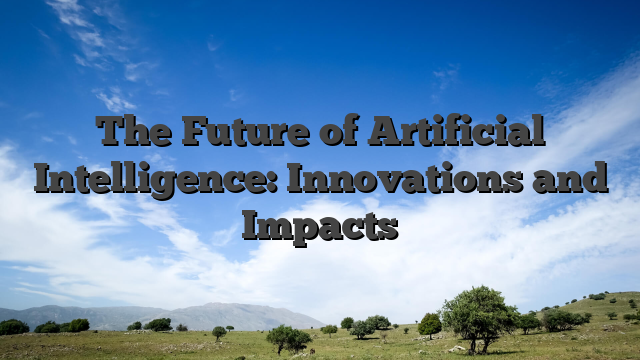Introduction to Artificial Intelligence
Artificial intelligence (AI) has evolved from a theoretical concept into a transformative force reshaping industries, economies, and daily life. At its core, AI technology leverages algorithms and data to mimic human cognition, enabling systems to learn, adapt, and make decisions. This advancement is driven by breakthroughs in machine learning and neural networks, which power everything from self-driving cars to personalized recommendations. As AI continues to grow, its implications span healthcare, business, and ethics, making it a critical topic for global discourse.
Key Applications of AI in Modern Society
AI technology permeates modern society, from smart home devices to predictive analytics in finance. Neural networks enable machines to recognize patterns, while machine learning allows systems to improve over time through experience. These innovations are revolutionizing sectors like education, transportation, and entertainment, offering solutions to complex challenges. However, the rapid adoption of AI raises questions about its long-term societal impact, particularly regarding privacy and job displacement.
How AI Transforms Healthcare
In healthcare, AI technology is redefining diagnostics, treatment, and patient care. Machine learning models analyze medical data to detect diseases earlier, while neural networks enhance imaging accuracy. For instance, AI-powered tools can predict heart conditions or identify cancerous cells in scans with remarkable precision. These advancements not only improve outcomes but also reduce costs, though ethical considerations around data usage remain paramount.
AI in Business and Industry
getlinks4you.com AI in business and industry drives efficiency through automation, predictive maintenance, and customer insights. Companies use machine learning to optimize supply chains and neural networks for real-time decision-making. From manufacturing to retail, AI technology enables scalable operations, reducing human error and enhancing productivity. However, integrating AI requires robust infrastructure and strategic planning to maximize benefits.
- Automation streamlines repetitive tasks, freeing employees for creative work.
- Data analysis via AI identifies trends, guiding informed business strategies.
- Personalized marketing uses neural networks to tailor consumer experiences.
Ethical Considerations in AI Development
Ethical AI development is crucial as AI systems influence critical domains like law enforcement and hiring. Bias in training data can perpetuate discrimination, while opaque algorithms raise transparency concerns. Ensuring accountability and fairness in AI technology requires collaboration between technologists, policymakers, and ethicists. Frameworks for ethical AI must address these challenges to build public trust.
The Role of Machine Learning in AI
Machine learning forms the backbone of modern AI, enabling systems to evolve without explicit programming. By analyzing vast datasets, these models uncover hidden patterns, powering everything from voice assistants to autonomous vehicles. Neural networks, a subset of machine learning, mimic the human brain’s structure, allowing computers to process information in layers. Together, they drive innovations in AI technology, though their complexity demands rigorous oversight.
Challenges Facing AI Adoption
- Lack of skilled professionals to develop and maintain AI systems.
- High costs associated with implementing AI technology in small businesses.
- Public skepticism due to fears of job loss and algorithmic bias.
Future Trends in AI Research
Future AI research focuses on general AI capable of performing any intellectual task, unlike current narrow AI. Advances in neural networks aim to create more adaptable systems, while quantum computing may accelerate processing speeds. Ethical AI will remain central, ensuring technologies align with societal values as they become more pervasive.
AI and Everyday Consumer Technology
AI technology enhances consumer experiences through smart speakers, virtual assistants, and recommendation engines. Neural networks personalize content on streaming platforms, while machine learning powers fraud detection in banking. These innovations make technology more intuitive, though they also highlight the need for user education on data privacy.
Government Policies and AI Regulation
Government policies are evolving to regulate AI technology, balancing innovation with public safety. Regulations often focus on ethical AI, ensuring transparency and preventing misuse. Countries are establishing guidelines to foster responsible development while encouraging investment in AI research and entrepreneurship.
Education and AI Literacy
- Curricula now include AI basics to prepare students for a tech-driven future.
- Online courses provide accessible training in machine learning and neural networks.
- Workshops help professionals adapt to AI-integrated workplaces.
Global Competition in AI Innovation
Global competition in AI innovation drives rapid progress, with nations investing heavily in research and development. Leading economies prioritize AI technology, fostering ecosystems that attract talent and startups. This race fuels breakthroughs but also raises concerns about geopolitical imbalances in access to advanced AI capabilities.
AI Startups and Entrepreneurship
AI startups are reshaping industries with innovative solutions, leveraging machine learning and neural networks to solve niche problems. Entrepreneurs are capitalizing on AI technology to create scalable products, from healthcare diagnostics to environmental monitoring. These ventures highlight the growing demand for AI-driven tools across sectors.
The Impact of AI on Employment
- Automation threatens jobs in manufacturing but creates new roles in AI maintenance.
- Workers must acquire skills in machine learning to remain competitive.
- Policies are emerging to support workforce transitions in an AI-driven economy.
Conclusion: Embracing AI Responsibly
Embracing AI responsibly requires a balance between innovation and ethical considerations. While AI technology offers unprecedented opportunities, its challenges—such as bias, privacy risks, and job displacement—demand proactive solutions. By fostering education, regulation, and inclusive development, societies can harness AI’s potential while safeguarding human values.



